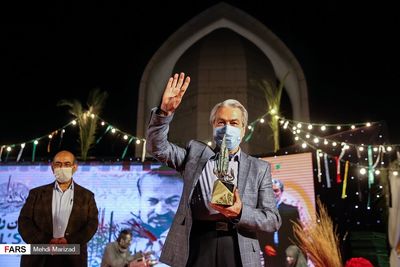The movie was screened in Festival of Festivals, a section dedicated to reviewing movies produced over the past 40 years on the Islamic Revolution, resistance and the 1980-1988 Iran-Iraq war, which is known as the Sacred Defense in Iran.
The organizers of the 16th edition of the festival also launched the Rasul Award named after war film director Rasul Mollaqolipur to honor innovative filmmakers and those artists active in the motion picture industry.
The closing ceremony of the festival, which is organized every year to mark the anniversary of the 1980-1988 Iran-Iraq war, was organized at the Sacred Defense Museum in Tehran.
“I try to feature what I feel in my music,” Entezami said after accepting the honor. “Composing music is not an easy task; every official has his own view and may like my works or not. Today, artists do not behave gracefully and I have given up music over the past eight years due to the disgraceful behavior towards me.”
Entezami has been honored at Iranian film festivals for his compositions for several acclaimed war dramas, including “From Karkheh to Rheine” and “The Glass Agency”.
Producer Manuchehr Mohammadi received the award for best feature for “The Survivor”. The movie was directed based on Palestinian author Ghassan Kanafani’s novel “Returning to Haifa”. It tells the story of a Palestinian couple who goes back to Haifa after the 1967 war to look for their baby, whom they were forced to leave behind in the war of 1948.
The award for best feature-length documentary went to “Women with Gunpowder Earrings” by Reza Farahmand, while “A Letter from Damascus” by Mehdi Ebrahimkhani was selected as best short documentary.
“All Maryams” by Mohammad Eskandarzadeh won the award for best short fiction and “Silent City” by Amir Mehran was picked as best animation.
The organizers also honored director Jamal Shurjeh, producer Mohsen Ali-Akbari and actor Jamshid Hashempur with lifetime achievement awards.
Shurjeh, director of the co-production between Iran and Algeria “Ahmed Bey” who is suffering from a brain disease, received his award sitting on his wheelchair and acknowledged the audience on stage by raising his hand in salute.
In his acceptance speech, Ali-Akbari asked everybody to visit occasionally the war veterans who are being kept at medical centers.
Hashempur paid a tribute to director Rasul Mollaqolipur and said, “I was strongly influenced by Rasul.”
This year, the organizers initiated the Health Defenders category in collaboration with the Health Ministry in honor of the medical workers on the front lines of the campaign against COVID-19.
A number of films focusing on the endeavors health workers made during the pandemic competed in this section.
“The Savior” by Arjun Mukherjee from India received the award for best animation in this section. The award for best motion graphics went to “Corona” by Puya Reisi.
“Once Upon a Time Again” by Mohajer Tohidparast was selected as best music video, and “In Night’s Silence” by Amir-Hossein Saberi was named best short documentary.
The award for best short film was presented to “The Last Visit” by Mohsen Mashreqi.
In addition, the festival honored Health Minister Masud Namaki with its special medal.
The second part of the festival will be held from November 21 to 27 to celebrate the anniversary of Basij Day, which falls on November 25.
Source:Tehran Times

